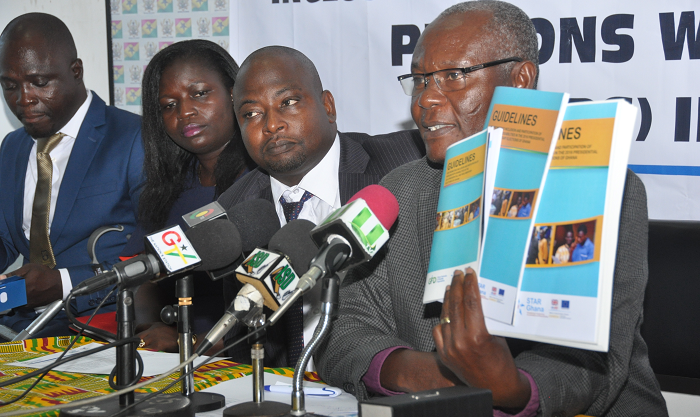The Ghana Federation of Disability Organisations (GFD) has called on political parties to streamline issues of disability into their 2016 election manifestoes.
The GFD has also asked for inclusion of Persons With Disabilities (PWDs) in all processes leading to the 2016 election.
The Coordinator of Star-Ghana’s 2016 Election Project, Mr Joshua Makubu, made the call at the launch of the guidelines for the inclusion and participation of PWDs in election 2016.
The event was on the theme “Inclusion Matters: Access and Participation of PWDs in Election 2016.”
It brought together participants from disability organisations, representatives of some political parties, National Commission for Civic Education (NCCE), the Electoral Commission (EC) and a section of the public.
The guidelines
The guidelines contain key challenges PWDs face in terms of elections and social inclusion, some of which include inaccessibility of information and polling stations, policy exclusion on the part of political parties and inequalities in political appointments.
Three copies of the guidelines, which were in normal font size, large font size, and on braille, copies of which will be presented to the stakeholders and policy makers, were launched.
It also spelt out modalities to engage political parties, civil society organisations (CSOs) and policy makers on issues concerning PWDs.
The way forward
Mr Makubu said the premises of polling stations ought to be accessible to all manner of people, including PWDs.
“The EC and other stakeholders must factor the plight of disabled persons into their plans. For instance, how can political parties hold their meetings in offices located on high-rise buildings, which are not disability-friendly, and expect PWDs to be part of it,” he asked.
On access to information, he called on the stakeholders such as the EC and the political parties to present their messages in a form that could be accessed by PWDs.
“There are some persons who are visually impaired or hard of hearing. In view of this fact, political parties ought to present their campaign messages in the form text with large font size, audio, and video to meet the need of all people,” he added.
Mr Makubu further observed that there were more qualified and capable PWDs who could contribute to national development in various capacities but who have been sidelined in terms of political appointments.
Equal participation
The acting Chairman of the NCCE, Mr Samuel Akuamoah, said the guidelines had come at a good time and urged PWDs to engage the political parties to ensure that the ideas espoused in the guidelines were mainstreamed into the 2016 manifestoes.
He said PWDs constituted a significant portion of the population that ought to be recognised in the formulation of national policies.
A member of the executive board of GFD, Mr Mohammed Abdul Aziz, said PWDs had the right to participate in all democratic processes, for which reason he called on political parties and stakeholders to be circumspect in how they took decisions concerning them.
“We need jobs, we need equal opportunities for education, as well as the right to participate fully in all democratic processes,” he added.

